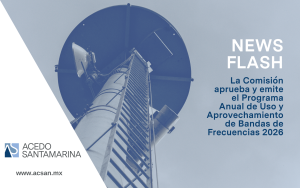
Pursuant to the deadlines set forth in the Law to Regulate Financial Technology Institutions (“Fintech Law”), published in the Official Gazette of the Federation on March 9 of this year, the general provisions applicable to Financial Technology Institutions and the general provisions referred to in Article 58 of the Law to Regulate Financial Technology Institutions (the “Provisions”) were published in the Official Gazette of the Federation on September 10, 2018, as well as Circular 12/2018 addressed to Electronic Payment Fund Institutions, regarding the General Provisions applicable to the operations of Electronic Payment Fund Institutions (the “Circular”).
The Provisions seek to establish a regulatory framework applicable to the organization of Financial Technology Institutions (the “FTIs”), as well as to the operation of crowdfunding institutions (better known as “Crowd funds”), in order to provide legal certainty and protection to the financial stability of the users participating in them.
In this regard, the Provisions regulate issues applicable to FTTs, such as: (i) requirements to request authorization; (ii) the minimum capital they must have; (iii) limits on the receipt of cash resources and transfer of funds; and (iv) matters relating to its accounting.
On the other hand, certain aspects related to crowdfunding institutions are regulated, such as: (i) issues related to the electronic risk register; (ii) the methodology for the evaluation, selection and qualification of applicants and projects; (iii) the limits of resources that they may hold on behalf of their clients; (iv) the mandates and commissions that they enter into; and (v) aspects related to its Business Continuity Plan, as such term is defined in the Provisions.
In addition, the Provisions establish rules to be observed by the FTTs regarding the prevention of transactions with resources of illicit origin and financing of terrorism, based on the idea that nowadays financial services are provided based on technological innovations that could facilitate transactions with resources of illicit origin. To this effect, the provisions establish obligations to be borne by the FTTs, among which are the following: (i) design and implement methodologies to evaluate the risks derived from the services they provide; (ii) effective methodologies to identify its customers and classify the degree of risk of each one of them; as well as (iii) Modify its internal structure in order to have a “Compliance Officer” and a “Communication and Control Committee”, specialized in the prevention of operations with resources of illicit origin and financing of terrorism.
Finally, the purpose of the Circular is to ensure the proper functioning of the payment systems and the healthy development of the financial system, as well as to protect the interests of the general public, in such a way that the Circular establishes a regulatory framework in order to take advantage of the efficiency benefits that electronic payment fund institutions can provide. For this reason, the Circular establishes requirements that these institutions must observe, specifically in matters related to the issuance and administration of these institutions.
At Acedo Santamarina we have a solid regulatory practice and are ready to advise our clients regarding the operation of FTTs and the prevention of transactions with resources of illicit origin and financing of terrorism. For further information contact Andrés Acedo at aacedo@acsan.mx or Laura Gabriela Castillo at gcastillo@acsan.mx.





